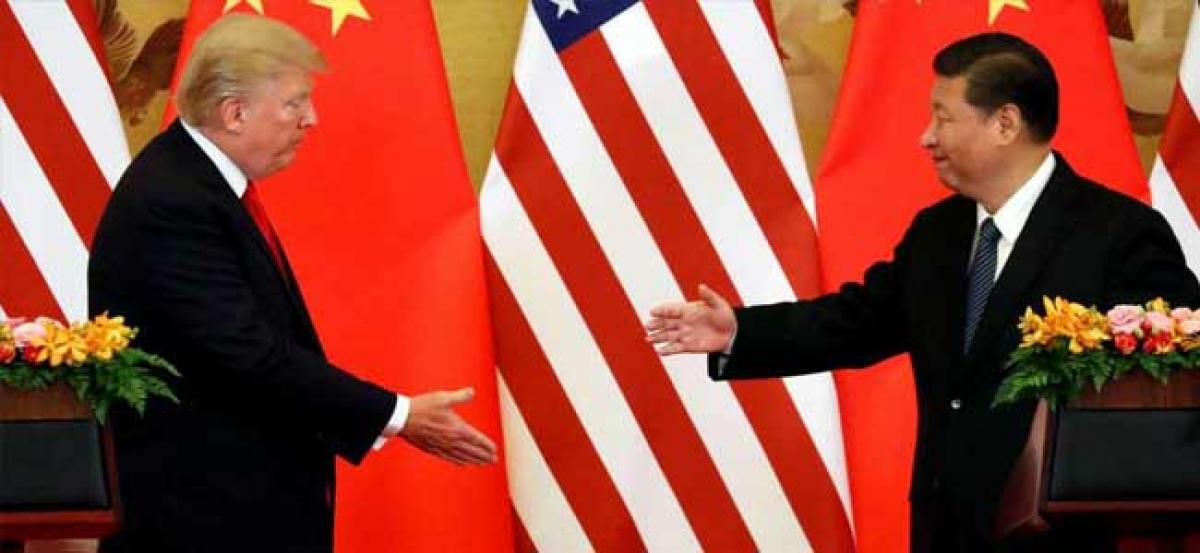Live
- Over 7,600 Syrians return from Turkiye in five days after Assad's downfall: minister
- Delhi BJP leaders stay overnight in 1,194 slum clusters
- Keerthy Suresh and Anthony Thattil Tie the Knot in a Christian Ceremony
- AAP, BJP making false promises to slum dwellers for votes: Delhi Congress
- 'Vere Level Office' Review: A Refreshing Take on Corporate Life with Humor and Heart
- Libya's oil company declares force majeure at key refinery following clashes
- Illegal Rohingyas: BJP seeks Assembly session to implement NRC in Delhi
- Philippines orders full evacuation amid possible volcanic re-eruption
- Government Prioritizes Welfare of the Poor, says Dola Sri Bala Veeranjaneyaswamy
- Two Russian oil tankers with 29 on board damaged due to bad weather
Just In

China expressed anger on Thursday after the US Senate passed a bill promoting closer US ties with Taiwan, but the step drew praise from the self-ruled island which pledged to deepen cooperation.
China expressed anger on Thursday after the US Senate passed a bill promoting closer US ties with Taiwan, but the step drew praise from the self-ruled island which pledged to deepen cooperation.
The move adds to tensions between China and the United States, already at loggerheads over trade, with President Xi Jinping's close economic advisor Liu He in Washington this week to try and avert a trade war.
Several top US steel and aluminium executives have been invited to the White House later on Thursday for what could be a major trade announcement, according to two people familiar with the meeting.
US President Donald Trump has vowed to take steps to crack down on imports of steel and aluminium and has been considering imposing hefty tariffs on imports of the metals from China and other countries.
Beijing considers democratic Taiwan to be a wayward province and integral part of "one China", ineligible for state-to-state relations, and has never renounced the use of force to bring the island under its control.
Chinese Foreign Ministry spokeswoman Hua Chunying said though the bill was not legally binding and seriously violates the "one China" principle.
"China is strongly dissatisfied with this and resolutely opposes it, and has already lodged stern representations with the US side," she told a daily news briefing.
The "one China" principle is the foundation for China-US ties, Hua added.
China urges the United States to cease official exchanges with Taiwan and "prudently and appropriately handle issues related to Taiwan to avoid seriously interfering with and damaging China-US relations", she said.
The Senate passed the Taiwan Travel Act by unanimous consent. It passed the House of Representatives in January, also without opposition. The legislation only needs Trump's signature to become law.
The bill says it should be US policy to allow officials at all levels to travel to Taiwan to meet their Taiwanese counterparts, permit high-level Taiwanese officials to enter the United States "under respectful conditions" and meet with US officials, and encourage Taiwanese economic and cultural representatives to conduct business in the United States.
White House officials did not immediately respond when asked if Trump planned to sign the legislation. It would be unusual for a president to veto a measure that passed unanimously.
TAIWAN PRAISES "JOINT VALUES"
Taiwan's Foreign Ministry thanked the United States for the unanimous support for the bill and for the US government's increasingly friendly and open attitude towards Taiwan.
"The Foreign Ministry will keep developing an even more substantive cooperative relationship with the United States, to promote both sides' joint values and mutually-beneficial interests," it said.
Taiwan's Presidential Office said the United States was its most important international ally, and that it would discuss the matter with the United States and further strengthen relations.
The United States has no formal ties with Taiwan but is bound by law to help it defend itself and is the island's main source of arms. China regularly says Taiwan is the most sensitive issue in its ties with Washington.
China's hostility towards Taiwan has risen since the election as president of Tsai Ing-wen from the pro-independence Democratic Progressive Party (DPP) in 2016.
China suspects Tsai wants to push for formal independence, a red line for Communist Party leaders in Beijing, though she has said she wants to maintain the status quo and is committed to ensuring peace.
On Wednesday, two former Taiwan presidents, Lee Teng-hui and Chen Shui-bian, backed a bid for a referendum on Taiwan independence next year, though Taiwan's government has not supported the plan.
Were such a vote to happen, China could feel it has to activate its Anti-Secession Law, which allows it to use force on Taiwan if deemed necessary to prevent the island from seceding.

© 2024 Hyderabad Media House Limited/The Hans India. All rights reserved. Powered by hocalwire.com







